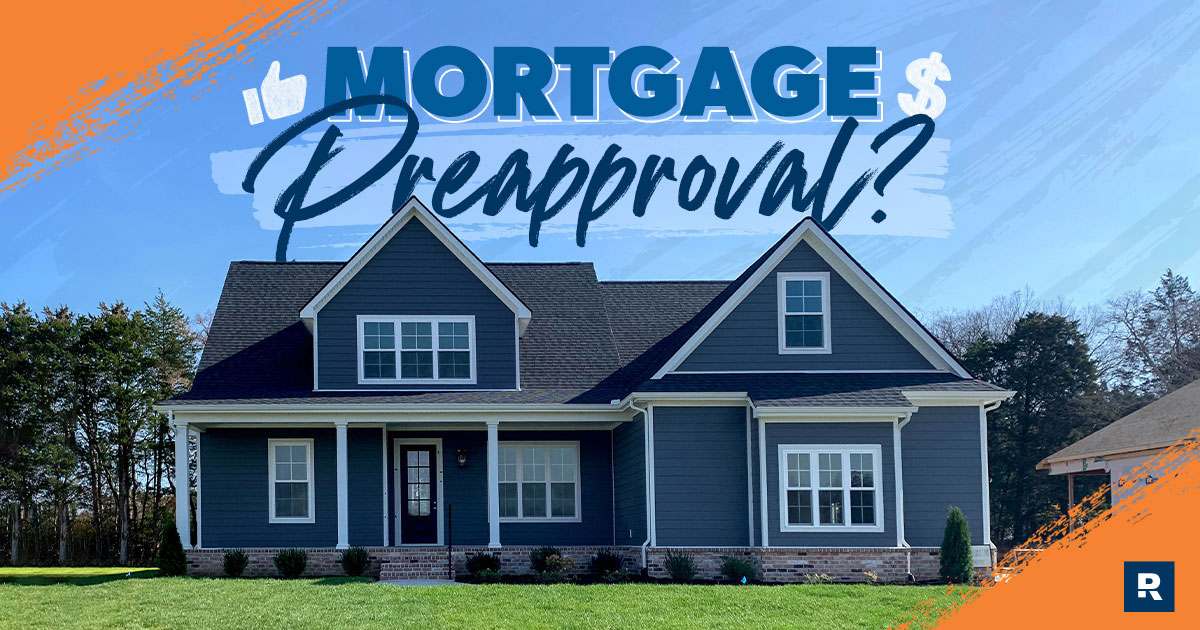What Is a Mortgage Preapproval?
10 Min Read | Dec 12, 2024

Buying a house isn’t quite as confusing as high school chemistry class, but it can be pretty tricky when you find yourself drowning in unfamiliar terms—like mortgage preapproval.
Many lenders claim that if you’re not preapproved for a mortgage, you don’t stand a chance in the housing market. But what does mortgage preapproval mean? And will it really help you stand out from other buyers in the real estate market?
Let’s break down the mortgage preapproval process and find out!
- What is a mortgage preapproval?
- Why would you want a mortgage preapproval?
- Is a mortgage preapproval the same as a prequalification?
- What do you need to get a mortgage preapproval?
- How long does it take to get preapproved?
- When should you get a mortgage preapproval?
- Does the preapproval expire?
- How far in advance should you get preapproved for a mortgage?
- Does getting preapproved commit you to anything?
- Does a preapproval hurt your credit score?
- Does preapproval mean you get the mortgage?
- Is there anything better than a mortgage preapproval?
1. What is a mortgage preapproval?
Don’t be fooled: A mortgage preapproval isn’t a promise that you’ll get a loan for the home you want to buy. A mortgage preapproval only means a loan officer has looked at your finances—your income, debt, assets and credit history—and determined how much money you can borrow, how much you could pay per month, and what your interest rate will be.
So, what’s so great about a mortgage preapproval?
Once a lender has preapproved you for a mortgage, you’ll get a letter you can then take to sellers. This letter shows sellers you’ve already started working with a lender, and that the lender is willing to work with you. It lets sellers know you are a legit buyer who can afford their house and aren’t just wasting their time by window-shopping.
2. Why would you want a mortgage preapproval?
While a preapproval doesn’t guarantee you’ll get a mortgage, being preapproved does have some advantages. Here are three reasons you might want a mortgage preapproval:
- It gives you confidence in your search. When you know how much mortgage you can afford, you can look for houses in your budget. That way, you won’t have to deal with the heartbreak of falling in love with a house only to discover you can’t afford it.
- It puts you on the fast track to closing. Because most of your information is in the lender’s system, a mortgage preapproval accelerates the loan process once you make an offer.
- It establishes your credibility as a home buyer. A mortgage preapproval shows home sellers that you have your finances in check, that you’re serious about buying a house, and that you’re pretty likely to qualify for a loan if they decide to sell you their home.
3. Is a mortgage preapproval the same as prequalification?
No! Mortgage preapproval and prequalification are not interchangeable.
The difference is really in the depth of the lender’s research. In order to be prequalified, you report your income, debt and assets to your lender, and your lender—without questioning your numbers—tells you, "Based on the numbers you gave us, you may qualify for this much of a mortgage."
But those numbers don’t have to be accurate. If you bent the numbers—if you weren’t precise about your income, your tax returns or your debt—a prequalification will only give you a rough estimate.
A mortgage preapproval, on the other hand, is a thorough look at your finances. A lender won’t simply ask how much income you make—you’ll have to prove it. Your lender will also pull your credit history, verify your income and assets, and assess your financial situation before they give you a mortgage preapproval.
Get the right mortgage from a trusted lender.
Whether you’re buying or refinancing, you can trust Churchill Mortgage to help you choose the best mortgage with a locked-in rate.
4. What do you need to get a mortgage preapproval?
Since the mortgage preapproval process is so rigorous, you’ll need to give your lender a bunch of documents. Here’s what your lender will ask for:
Identification
Income
Assets
5. How long does it take to get preapproved?
As long as you have all your documents ready, you should be able to get a mortgage preapproval the same day you talk to your lender.
Dave Ramsey recommends one mortgage company. This one!
But that’s assuming your finances are in pretty good shape. If you have lots of debt, a past foreclosure or bankruptcy, or a low credit score, the preapproval process can be much longer—anywhere from a few days to several months depending on the complexity of your finances.
The only way to speed up the process is to give your lender all the documents listed above. Don’t forget (or try to hide) anything!
6. When should you get a mortgage preapproval?
Any good real estate agent will tell you getting preapproved for a mortgage is one of the first steps in the home-buying journey. But where exactly does this step fall? Before you even think about getting a home loan, you should have all of the following taken care of:
Your Guide to Finding an Affordable Home You Love
Learn our simple, step-by-step process to make closing on the right home for you easier and less stressful.
7. Does the preapproval expire?
All mortgage preapproval letters have an expiration date. Many things can change after you get preapproved, like your income, credit history, or even the interest rate. Because of this, your preapproval normally lasts for 60–90 days. When the preapproval expires, you’ll have to update your paperwork to get a new one.
8. How far in advance should you get preapproved for a mortgage?
Since preapprovals only last a few months, it’s best to talk to your lender right before you get serious about your home search. If you jump the gun and get a preapproval letter before you’re ready to buy a home, you could end up having to go through the process all over again in a few months. Save yourself some trouble—digging back through tax records isn’t fun for anyone!
9. Does getting preapproved commit you to anything?
A preapproval letter doesn’t bind you to a lender. But if you decide to take out a mortgage through another lender, you’ll have to repeat the paperwork. If you take out a mortgage through the lender who issued your mortgage preapproval, they’ll have your paperwork on file, which will save you time when you’re closing on a house.
10. Does a preapproval hurt your credit score?
Getting preapproved for a mortgage—even by multiple lenders at once—won’t hurt your credit score. While it may knock off a few points, it won’t drop your score by a significant amount.
Ready to have your mind blown? You can get preapproved for a mortgage even if you don’t have a credit score. Here’s the deal: If you pay off your debt and live debt-free (also 100% doable), eventually you’ll have no credit score!
So how do you get preapproved? You just need to work with a lender like Churchill Mortgage that still does manual underwriting, a process where a lender reviews your loan application and determines if they can trust you to repay the loan.
Now, this doesn’t mean that just anyone can walk out with a home loan using manual underwriting. In addition to the info you need for a normal preapproval, you must:
- Have a strong employment history and personal income to support the loan
- Provide documentation that shows you’ve regularly paid expenses like rent, electric bills, water bills, cell phone bills, etc. for 18–24 months
Manual underwriting is little more difficult than underwriting based on a credit score, but you can help the process go smoother if you save a 20% down payment and choose a 15-year mortgage with payments that are no more than 25% of your take-home pay.
11. Does preapproval mean you get the mortgage?
Getting preapproved is a good first step toward getting a mortgage, but preapproval doesn’t mean you’ll get a mortgage. It’s not super common, but a lender can deny your loan after preapproval.
After you have a home under contract and apply for a loan, the mortgage company will ask for updated financial documents and send them to be reviewed by an underwriter to make sure everything is in good order. Loans usually get denied if your debt-to-income ratio changed significantly after you got preapproved—like if you lost your job, spent your down payment (don’t do this), or took out a loan for a car, furniture or something else (don’t do this either).
12. Is there anything better than a mortgage preapproval?
In competitive housing markets, mortgage preapproval letters have lost some authority. Most buyers have them, and in a multiple-offer situation, they just don’t have what it takes to make you stand out.
Fortunately for you, there’s something better!
If you want a true competitive advantage, Churchill Mortgage’s Certified Home Buyer program is a great option. When you become a certified home buyer, you have all the advantages of a preapproval—like credibility as a home buyer, confidence in your search, and an accelerated closing process.
But unlike preapproved mortgages that only involve a loan officer, your certified home buyer application is reviewed by a mortgage underwriter—which is a huge advantage when you start shopping for houses! You’ll be able to close faster and have a leg up on other buyers who will probably have to wait for an underwriter to review their application.
Next Steps
- Figure out if you’re ready to buy a house.
- Use our calculator to see how much house you can afford.
- Connect with a RamseyTrusted real estate agent to help you find a house.
- Take your home-buying credentials to the next level today and get in touch with a Churchill Mortgage expert!
Did you find this article helpful? Share it!

We Hear You!
We’re considering adding the ability to save articles to your Ramsey account.




